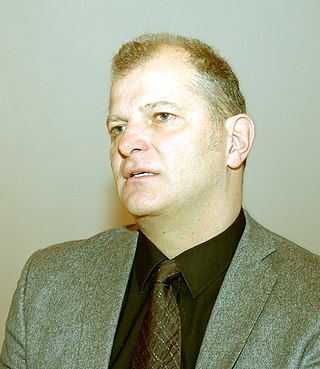
Jacob Ludwig Karl Grimm, also known as Ludwig Karl, was a German author, linguist, philologist, jurist, and folklorist. He formulated Grimm's law of linguistics, and was the co-author of the Deutsches Wörterbuch, the author of Deutsche Mythologie, and the editor of Grimms' Fairy Tales. He was the older brother of Wilhelm Grimm; together, they were the literary duo known as the Brothers Grimm.
Dramaturgy is the study of dramatic composition and the representation of the main elements of drama on the stage.
Johann Martin Lappenberg was a German diplomat, groundbreaking medievalist, and historian with a focus on the early Holy Roman Empire, the Hanseatic League, and Saxon England.

Manuel Deodoro da Fonseca was a Brazilian politician and military officer who served as the first president of Brazil. He was born in Alagoas in a military family, followed a military career, and became a national figure. Fonseca took office as provisional president after heading a military coup that deposed Emperor Pedro II and established the First Brazilian Republic in 1889, disestablishing the Empire. After his election in 1891, he stepped down the same year under great political pressure when he dissolved the National Congress. He died less than a year later.

The Hamburg State Opera is a German opera company based in Hamburg. Its theatre is near the square of Gänsemarkt. Since 2015, the current Intendant of the company is Georges Delnon, and the current Generalmusikdirektor of the company is Kent Nagano.

The Staatskapelle Berlin is a German orchestra and the resident orchestra of the Berlin State Opera, Unter den Linden. The orchestra is one of the oldest in the world. Until the fall of the German Empire in 1918 the orchestra's name was Königliche Kapelle, i.e., Royal Orchestra.
Harry Alfred Robert Kupfer was a German opera director and academic. A long-time director at the Komische Oper Berlin, he worked at major opera houses and at festivals internationally. Trained by Walter Felsenstein, he worked in the tradition of realistic directing. At the Bayreuth Festival, he staged Wagner's Der fliegende Holländer in 1978 and Der Ring des Nibelungen in 1988. At the Salzburg Festival, he directed the premiere of Penderecki's Die schwarze Maske in 1986 and Der Rosenkavalier by Richard Strauss in 2014.

Eduard Christian Arning was an English-German dermatologist and microbiologist from Manchester.

James Valenti is an American operatic tenor with an active international career specializing in leading roles in the Italian and French repertoire. Born and raised in New Jersey, in the United States, he attended St. Helena School and North Hunterdon High School before becoming a graduate of West Virginia University and the Academy of Vocal Arts in Philadelphia, Pennsylvania. Valenti also holds a Master of Voice Pedagogy degree from Westminster Choir College of Rider University in Lawrenceville, New Jersey. Valenti made his professional debut in 2003 as Rodolfo in La bohème at the Rome Opera, and was the 2010 winner of the Richard Tucker Award.

Martin Kušej is an Austrian theatre and opera director, and is director of the Burgtheater Vienna. According to German news magazine Focus, Kušej belongs to the ten most important theatre directors who have emerged in the German-speaking world since the millennium. He is considered one of the most important directors working today, acclaimed for his dark and incisive productions.
Michael Leinert is a stage director, dramaturg, editor and author. His father, Friedrich Leinert was a composer, conductor and professor of music in Hannover. Leinert's mother was an operatic and concert singer.

Lopes Suasso is the name of an important aristocratic Portuguese Jewish family that played an important role in banking.
Carla Spletter was a German operatic soprano.

Günter Jena is a German choral conductor and musicologist. He was the director of church music at St. Michaelis in Hamburg from 1973 to 1997. He founded the festival Bach-Tage Hamburg, and provided music for ballet performances of choreographer John Neumeier at the Hamburg State Opera, including Bach's St Matthew Passion.
Colette Lorand was a Swiss operatic soprano who made an international career. Known as a coloratura soprano, she created several roles in world premieres, including Sibylle in Carl Orff's De temporum fine comoedia in 1973 at the Salzburg Festival, and Regan in Aribert Reimann's Lear at the Nationaltheater München in 1978, also in the French premiere of this opera in Paris in 1982.

Kevin John Edusei is a German conductor. He is in his eighth and final season as Chief Conductor of Munich Symphony Orchestra, and from the 2022/2023 season will be Principal Guest Conductor of Fort Worth Symphony Orchestra.
Heinz Kruse was a German opera singer (tenor).
Hartmut Welker is a German operatic bass-baritone.
Wulf Konold was a German musicologist, dramaturge and theatre director.
Garrett Keast is an American conductor of symphony orchestra, opera, and ballet and founder of the Berlin Academy of American Music (BAAM).










